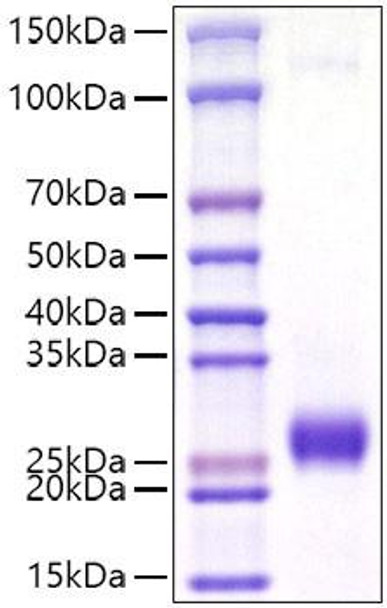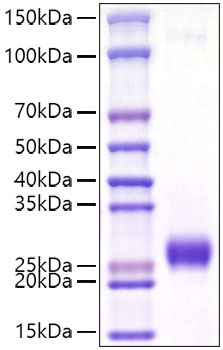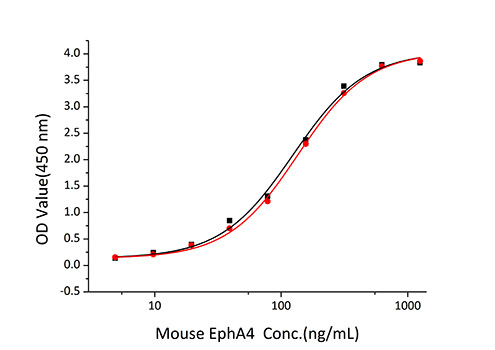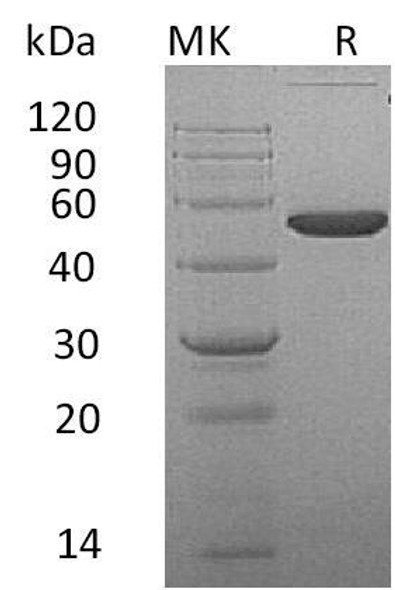Description
Recombinant Mouse Ephrin-A2/EFNA2 Protein
The Recombinant Mouse Ephrin-A2/EFNA2 Protein is a high-quality recombinant protein designed for murine biological research applications. This protein serves as an essential reagent in mouse model studies, comparative immunology research, and preclinical therapeutic evaluations, enabling scientists to investigate Ephrin-A2/EFNA2 biology and its relevance to human disease mechanisms through translational research approaches.
This product (SKU: RPCB1556) is produced using HEK293 cells and features a C-His tag for convenient detection and purification. The protein exhibits a calculated molecular weight of 19.71 kDa with an observed molecular weight of 25-30 kDa under denaturing conditions, achieving ≥ 95 % as determined by SDS-PAGE.. Functional bioactivity has been validated through rigorous quality control assays, confirming its suitability for demanding research applications.
Key Features
| High Purity by Affinity Chromatography | |
| Mammalian & Bacterial Expression Systems | |
| High lot-to-lot consistency via strict QC |
| Product Name: | Recombinant Mouse Ephrin-A2/EFNA2 Protein |
| SKU: | RPCB1556 |
| Size: | 10 μg , 20 μg , 50 μg , 100 μg |
| Reactivity: | Mouse |
| Synonyms: | Elf1, Epl6, CEK7L, Eplg6, Lerk6, EFNA2 |
| Tag: | C-His |
| Expression Host: | HEK293 cells |
| Calculated MW: | 19.71 kDa |
| Observed MW: | 25-30 kDa |
| Gene ID: | 13637 |
| Protein Description: | High quality, high purity and low endotoxin recombinant Recombinant Mouse Ephrin-A2/EFNA2 Protein (RPCB1556), tested reactivity in HEK293 cells and has been validated in SDS-PAGE.100% guaranteed. |
| Endotoxin: | < 0.1 EU/μg of the protein by LAL method. |
| Purity: | ≥ 95 % as determined by SDS-PAGE. |
| Formulation: | Lyophilized from a 0.22 μm filtered solution of PBS, pH 7.4. |
| Bio-Activity: | Measured by its binding ability in a functional ELISA. Immobilized Mouse EFNA2 (RPCB1556) Protein at 2 μg/mL (100 μL/well) can bind Mouse EphA4 with a linear range of 4.88-129.3 ng/mL. |
| Reconstitution: | Centrifuge the vial before opening. Reconstitute to a concentration of 0.1-0.5 mg/mL in sterile distilled water. Avoid vortex or vigorously pipetting the protein. For long term storage, it is recommended to add a carrier protein or stablizer (e.g. 0.1% BSA, 5% HSA, 10% FBS or 5% Trehalose), and aliquot the reconstituted protein solution to minimize free-thaw cycles. |
| Storage: | Store at -20℃.Store the lyophilized protein at -20℃ to -80 ℃ up to 1 year from the date of receipt. After reconstitution, the protein solution is stable at -20℃ for 3 months, at 2-8℃ for up to 1 week. |
Ephrin-A2 also known as EFNA2 or EPH-related receptor tyrosine kinase ligand 6, is a member of the ephrin family. The Eph family receptor interacting proteins (ephrins) are a family of proteins that serve as the ligands of the Eph receptor, which compose the largest known subfamily of receptor protein-tyrosine kinases (RTKs). Ephrin-A2 and their Eph family of receptor tyrosine kinases are expressed by cells of the SVZ. Eph/ephrin interactions are implicated in axon guidance, neural crest cell migration, establishment of segmental boundaries, and formation of angiogenic capillary plexi. Ephrin subclasses are further distinguished by their mode of attachment to the plasma membrane: ephrin-A ligands bind EphA receptors and are anchored to the plasma membrane via a glycosylphosphatidylinositol (GPI) linkage, whereas ephrin-B ligands bind EphB receptors and are anchored via a transmembrane domain. Ephrin-A2 regulates the position-specific affinity of limb mesenchyme and is involved in cartilage pattern formation in the limb.








